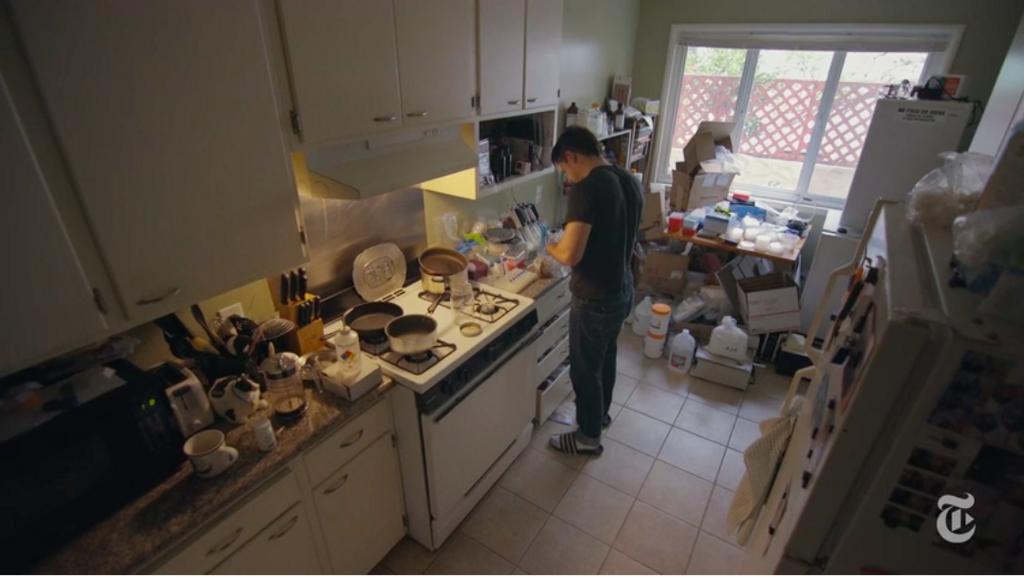Eat Shit And Live
A pretty good advertisement for not doing science at home.

Today’s New York Times video of the day is “Gut Hack,” a short film that’s part of their Op-Docs series. This one’s about Josiah Zayner, a former NASA scientist and a man attempting to giving himself a full microbiome transplant. Mainly the thing here is he’s doing a fecal transplant, and that’s the gross and hard to (sorry) stomach part, but I did find it interesting that he aimed to get transplant donor bacteria to his skin and membranes (nose, mouth) as well as his gut. It’s sort of like the bacterial equivalent of the scene in Gattaca where they graft a new fingerprint onto the guy’s hand so he can have someone else’s signature mark. In order to do all this, he had to sanitize himself basically as much as possible by taking a course of antibiotics and scrubbing his skin down in a hotel bathroom as though he’s about to commit a murder and try to leave as little DNA evidence as possible.
Just about a year ago, The Verge reported Zayner’s story in the form of a feature by Arielle Duhaime-Ross, with additional coverage on a podcast conversation between Liz Lopatto and Emily Yoshida. The footage from the Verge’s photoshoot appears to be from the same experimentation period as the short film, so I guess there were not one but two camera crews onsite for this man’s poop transplant? (Oh yeah, by the way, you can definitely see Zayner grinding up a poop solution with a mortar and pestle on his kitchen counter.)
Why we have an Op-Doc about a thing there is already an article and a podcast about I don’t know, but I assume the reason is something like “great minds” and also “the content has to be mined for every last drop.” The Verge folks provide what is, in my opinion, some pretty necessary caution and perspective to the whole experiment, stressing among other things the fact that, first of all, you can’t really scrub yourself clean of bacteria the way Zayner attempts to do—“Rubbing your skin with tetracycline powder is not going to sterilize it,” Elisabeth Bik, a microbiologist at Stanford University, told Duhaime-Ross. And second, Zayner was pretty lax in his methods. Duhaim-Ross writes:
I couldn’t help but notice Zayner cutting corners. After drying off, he put on a brand-new Hanes white T-shirt to prevent his old microbiome from recolonizing his body, but an old — though freshly laundered — pair of jeans. He sampled his arms, nose, and mouth, but he didn’t bother to take microbial samples from his genitalia, and didn’t plan on applying Michael’s skin bacteria to his penis or testicles. He told me that there just isn’t much scientific value in gathering that information. Over the course of his experiment, Zayner would only take a third of the poop pills that someone undergoing a standard FMT procedure would, stretched over a longer period of time.
Sure, he wasn’t doing good lab science, maybe because he wasn’t in a lab and didn’t “give a shit” (sorry) about his methods so long as he got enough gut bacteria to make his tummy feel better, and any feeling human can relate to that desperation. But an ineffective or unsuccessful transplant isn’t the worst thing that could happen—there are a lot of risks involved with fecal matter transplants (FMTs), like viruses and bacteria one could pick up in the process, especially if you do a colossally idiotic thing like not test the fucking donor’s bacteria for potentially harmful pathogens before you give it a new home in your washed-out gut.
But Zayner was that particular combination of desperate and zealous (as a righteous biohacker must be), and with some good reason:
Because shit is considered a medicine when it’s administered by a doctor, the procedure is strictly regulated by the US government, and is only available to patients with recurrent C. diff.
Tens of millions of people have bowel and gut issues that might be treatable (though perhaps not curable) with fecal transplants. One way of making them easier, argued a group of scientists in a Nature editorial, would be to reclassify human stool as tissue rather than a drug, so it would not be subject to clinical trials. The idea is not to bypass testing and experiments altogether, but to lower the bar for access so that’s getting an FMT is more like a blood or bone marrow transfusion. And the only way to do THAT is to pass an act of Congress! So ahhh, nevermind—pass the TUMS.
